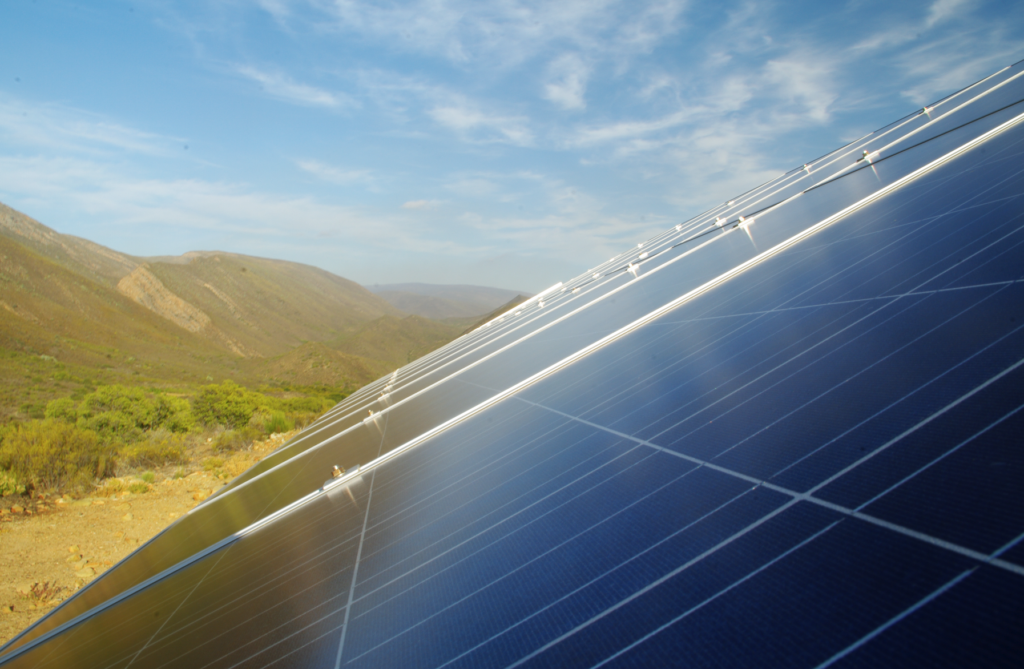Our project Two Dam Sustainable was named winner in the category: Net Zero Innovative Project Award at last night’s Green Building Council Leadership Awards.
The awards took place during the Green Building Council of South Africa’s (GBCSA) annual Green Building Convention. This Net Zero Innovative Project Award recognizes leading Net Zero projects that have achieved an innovative and cutting edge outcome in terms of net zero carbon, water, waste or ecology. Two Dam Sustainable, a rainbow trout farm near Montagu, Western Cape, was one of the first four pilot projects in South Africa to have been certified Net Zero Carbon under the GBCSA’s Green Star SA Net Zero Carbon certification in October 2017.

Congratulations to the other finalists and winners in the following categories:
Highest Rated Building
- Winner: 78 Corlett Drive in Johannesburg. Property Owner: Legaro Properties / AP: Solid Green
- Runner up: Watershed, Cape Town. Property Owner: V&A Waterfront / AP: Sow and Reap
Best Quality Submission
- Joint winner: Liberty Umhlanga. Property Owner: Liberty Group SA / AP: Misplon Consulting
- Joint winner: Menlyn Reconfiguration Phase 1. Property Owner: PIC / AP: Aurecon
- Runner up: GBCSA Offices, Johannesburg Property Owner: GBCSA / AP: Ecocentric & Termanzi
Established Green Star
- Winner: Misplon Consulting. AP on 36 Green Star Certified projects and AP on the first certified Green Star Custom industrial New Build Project
- Runner up: Annelide Sherrat, Solid Green AP on 19 Green Star Certified projects.
Rising Green Star
- Winner: Jesse Hamman, Solid Green AP on 4 certified projects and a number of others.
- Runner up: Daniel Grewan, LTM Energy. AP on 2 certified projects and a number of others
EDGE Innovative Housing Project Award
- Winner: Belhar Gardens Rental Estate, Cape Town. Project Owner: Madulammoho Housing Association
- Runner up: Ravenswood (Candlewood Crescent), Boksburg. Project Owner: IHS Investments
Net Zero Innovative Project Award
- Runner up: Linden Vleihuis, Johannesburg
What is the Net Zero certification?
The Net Zero certification system is aimed at projects that go beyond the partial reductions that are recognised in other green building tools like Green Star SA, and that have taken the initiative to completely neutralise or even positively redress their carbon emissions, water consumption, solid waste to landfill and/or their impacts on ecology.
The Net Zero certification scheme empowers the built environment to be able to transform for the betterment of both its occupants and the environment by becoming self-sustaining or even feeding back the resources that they use. The certification is what drives buildings to do better, and to be better, in a world that needs sustainable transformation.
How the Net Zero Certification came about:
The World Green Building Council launched a global project called “Advancing Net Zero”, which is aimed at promoting and supporting the acceleration of net zero carbon buildings to 100% for all new and existing buildings by 2050 (Worldgbc.org, 2018). Green Building Councils around the world have committed to leading their local construction industries to achieving this goal.
Image: WGBC Advancing Net Zero Infographic (2018).
While the GBCSA is meeting the parameters of the Advancing Net Zero programme, they are also going beyond what is required and have developed a certification standard that recognises Net Positive projects as well, and that expands the net zero certification to not just carbon but also waste, water and ecology.
What are the benefits of a Net Zero Certification?
The Net Zero certification holds many benefits for building occupants as well as the environment. These benefits include, but are not limited to:
- A reduction in environmental footprint
- Improved health and productivity levels
- Lower operating costs
- A future-proofed building and investment
- Enhanced marketability
More about Our Pilot Project Two Dam Sustainable
Two Dam Sustainable, which produces ethically made trout products, operates off-grid and runs almost entirely off of renewable energy. The majority of the energy used for the farm is provided by a 31 kW photovoltaic panel array and a ‘high pressure, low water volume’ micro-hydro turbine that generates up to 1kW of continuous electricity. The farm is also home to a hyper-efficient Recirculating Aquaculture System (RAS) – which is the first of its kind in Africa. The Rainbow Trout RAS operates sustainably by being an energy efficient low head recirculating system which requires comparatively low electrical energy as opposed to conventional high pressure RAS or high volume raceway cultures, which require and often pollute huge volumes of freshwater.
Read more by downloading the GBCSA project case study here.

We are fortunate to also currently be working on two other exciting Net Zero certification projects, namely The District, which is targeting Net Zero Water, and Virgin Active Constantia, which is targeting Net Zero Waste.
Current Net Zero projects
The District, Woodstock
The District, which is a Growthpoint property existing building located in Woodstock, Western Cape, is targeting a Green Star SA Net Zero Water Certification. The multi-tenant office and retail building, which currently has a water infiltration plant in its basement, uses underground water to supply 100% of the building, making it entirely off-grid and independent of municipal water. The water filtration plant can generate 80kL/day from water that occurs naturally underground from the mountain springs that flow to the basement of the building. They use the sump water to make drinking water, as well as use the grey water to flush their toilets.
Virgin Active, Constantia
The Virgin Active Health Club in South Africa are currently targeting a Green Star SA Net Zero Waste Certification for their health club in Constantia, Western Cape. Virgin Active Constantia currently diverts 93% of their waste from landfill and are offsetting the remaining 7% of general waste with carbon offsets as well as through members bringing their own recyclables to the club as a strategy that forms part of their offsetting efforts.
More about Net Zero
The Net Zero certification can be divided into four categories, namely: carbon, water, waste and ecology. Below are definitions of each subcategory of a Net Zero building, as provided by the Green Building Council of South Africa (Momberg, 2017):
A Net Zero Carbon building
A building which is already highly energy efficient, and the remaining energy demand is supplied by renewable energy, preferably through on-site production but this can be offset with off-site production too. This will result in Net Zero carbon emissions on an annual basis.
A Net Zero Water building
A building that is designed, constructed and operated to greatly reduce its water consumption and then offset its remaining water demand with harvested, recycled and reused water such that the volume of water consumed is the same as that produced, or even Net Positive where the water recycled/harvested is greater than that consumed.
A Net Zero Waste building
A building which reduces, reuses, and recovers its waste streams to convert them to valuable resources with zero solid waste being sent to landfills over a period of 12 months. Alternatively the building can take waste from other sites and divert it for reuse, making the building Net Positive regarding waste (Ecolution, 2018)
A Net Zero Ecology building
A building which does not reduce the ecological value of the site during development for greenfield sites. Alternatively, a Net Positive Ecology project increases the ecological value of the site for brownfield sites, greenfield sites and/or existing developments (Ecolution, 2018).
Resources:
GBCSA. (n.d.). Net Zero. [online] Available at: https://gbcsa.org.za/certify/green-star-sa/net-zero/ [Accessed 25 Sep. 2018].
Ecolution. (2018). Net Zero Certification. [online] Available at: https://ecolution.co.za/net-zero-certification/ [Accessed 25 Sep. 2018].
Momberg, T. (2017). GBCSA – Net Zero/Net Positive Certification Scheme. 2nd ed. [ebook] Cape Town: Green Building Council South Africa, p.2. Available at: https://gbcsa.org.za/ [Accessed 26 Sep. 2018].
Worldgbc.org. (2018). What is Net Zero? | World Green Building Council. [online] Available at: http://www.worldgbc.org/advancing-net-zero/what-net-zero [Accessed 25 Sep. 2018].”


